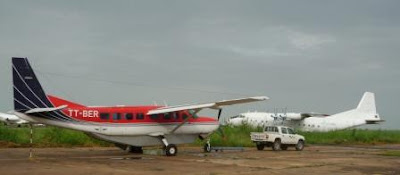I saw a statistic recently that Chad has the equivalent of one doctor for every 28,000 people. With the exception of South Sudan (which is the country that embodies the word 'exception') my impression of Chad is that the standard of health care generally available to the average person is the worst of all the African countries I have lived in.
One of the benefits we provide for our Chadian staff is to pay a percentage of their medical bills. As the person who authorises these payments I get to see the details of what they have been treated for and the medication they have been prescribed. Almost without exception and regardless of the true nature of the illness each person seems to be routinely prescribed high doses of pain killers, antibiotics and anti-malaria drugs. It is not uncommon for all these drugs plus the consultation and related tests to cost what would be a significant proportion of an individual's monthly salary. So not only are they being wrongly diagnosed and treated they are also being charged exorbitantly.
This week I have been unwell and when, after two days, I was feeling worse rather than better I decided the time had come to see a doctor. This enabled me to see first hand a hospital on the outskirts of N'Djamena that is trying to improve the health care that at least some Chadians can receive. The hospital at Guinebor II is funded, managed and run by a small team of expatriates, working alongside Chadian staff. Their primary goal is to provide health care services to the local population but as a 'sideline' they make themselves available to treat anyone from the international community who otherwise doesn't have access to 'quality' health care.
I arrived in the middle of the morning and there were maybe 100 people sitting on the ground, trying to stay in the limited shade that was available. It was difficult to know how many of these people were patients and how many were their accompanying family members. I first had to go to triage to be weighed and have my temperature, heart-rate and blood-pressure taken. Afia, the triage nurse, seemed highly amused by the 'narsara' (the generic Chadian word for 'white person') in her treatment room and smiled broadly throughout the whole process. When she had finished her initial assessment of me I was officially 'registered' as patient number 86 (presumably the 86th patient of the day) and handed my patient record book - half an exercise book with a picture of a footballer (who I think is Didier Drogba) on the cover...
 |
| My Chadian medical record - everything handwritten (in French) and mine to keep! |
I then went to the cashier and paid 5,000 CFA (about £6) for my consultation with the doctor. This was the maximum amount a consultation would cost, with the lower amounts presumably for seeing less well-qualified staff. I'm somewhat embarrassed (but also very grateful as I was feeling pretty rough by this point) that Dr. Mark saw me ahead of some of his other patients who had been waiting longer than I had. He prescribed me a course of antibiotics, that cost another 1,500 CFA (about £1.80), and already today I am feeling a lot better.
I was impressed by the calm and order of the hospital, by how they are trying to develop the skills and responsibilities of their Chadian staff and by their commitment to improve the health care given to the local community at a more affordable price. You can read an account of a day at the hospital
here.
Unfortunately for most of the residents of N'Djamena, including our staff, this hospital is too far out of the city for it to be a viable option for their treatment. However, it is encouraging to know that on Thursday of this week (as on every other day of the week) it provided a high level of health care to at least 86 people, in a country where such facilities are sadly in very short supply.
























